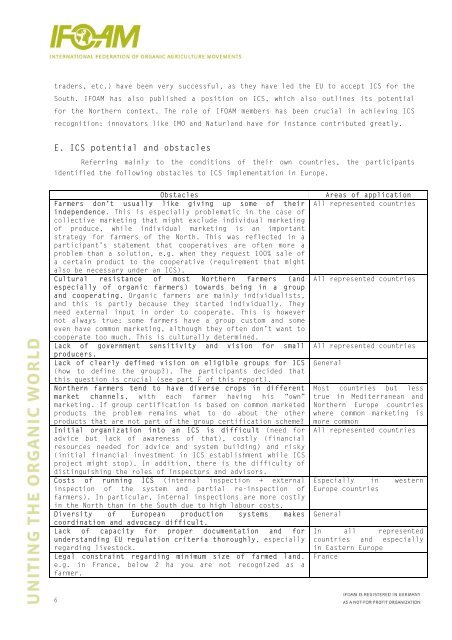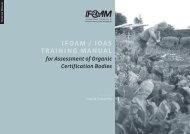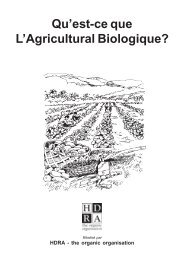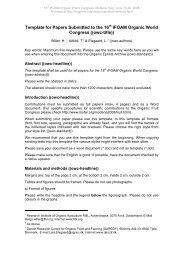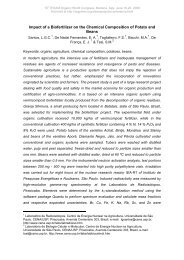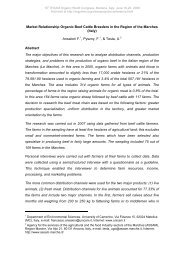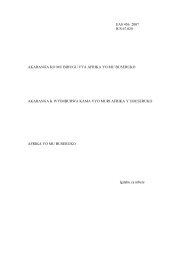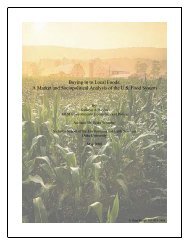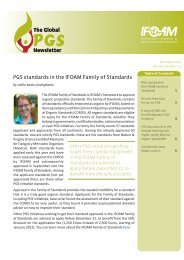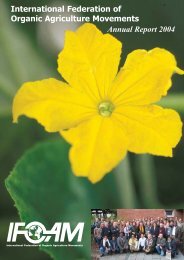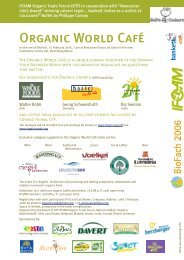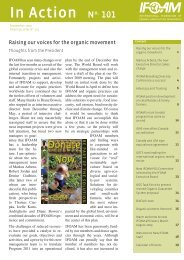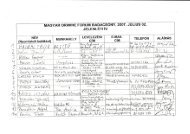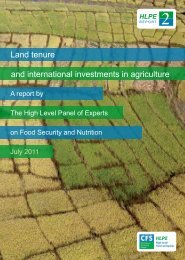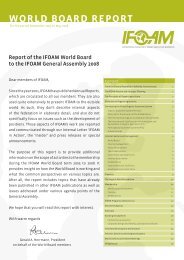Proceedings of the IFOAM workshop on Internal Control Systems (ICS)
Proceedings of the IFOAM workshop on Internal Control Systems (ICS)
Proceedings of the IFOAM workshop on Internal Control Systems (ICS)
You also want an ePaper? Increase the reach of your titles
YUMPU automatically turns print PDFs into web optimized ePapers that Google loves.
traders, etc.) have been very successful, as <str<strong>on</strong>g>the</str<strong>on</strong>g>y have led <str<strong>on</strong>g>the</str<strong>on</strong>g> EU to accept <strong>ICS</strong> for <str<strong>on</strong>g>the</str<strong>on</strong>g><br />
South. <str<strong>on</strong>g>IFOAM</str<strong>on</strong>g> has also published a positi<strong>on</strong> <strong>on</strong> <strong>ICS</strong>, which also outlines its potential<br />
for <str<strong>on</strong>g>the</str<strong>on</strong>g> Nor<str<strong>on</strong>g>the</str<strong>on</strong>g>rn c<strong>on</strong>text. The role <str<strong>on</strong>g>of</str<strong>on</strong>g> <str<strong>on</strong>g>IFOAM</str<strong>on</strong>g> members has been crucial in achieving <strong>ICS</strong><br />
recogniti<strong>on</strong>: innovators like IMO and Naturland have for instance c<strong>on</strong>tributed greatly.<br />
E. <strong>ICS</strong> potential and obstacles<br />
Referring mainly to <str<strong>on</strong>g>the</str<strong>on</strong>g> c<strong>on</strong>diti<strong>on</strong>s <str<strong>on</strong>g>of</str<strong>on</strong>g> <str<strong>on</strong>g>the</str<strong>on</strong>g>ir own countries, <str<strong>on</strong>g>the</str<strong>on</strong>g> participants<br />
identified <str<strong>on</strong>g>the</str<strong>on</strong>g> following obstacles to <strong>ICS</strong> implementati<strong>on</strong> in Europe.<br />
Obstacles Areas <str<strong>on</strong>g>of</str<strong>on</strong>g> applicati<strong>on</strong><br />
Farmers d<strong>on</strong>’t usually like giving up some <str<strong>on</strong>g>of</str<strong>on</strong>g> <str<strong>on</strong>g>the</str<strong>on</strong>g>ir All represented countries<br />
independence. This is especially problematic in <str<strong>on</strong>g>the</str<strong>on</strong>g> case <str<strong>on</strong>g>of</str<strong>on</strong>g><br />
collective marketing that might exclude individual marketing<br />
<str<strong>on</strong>g>of</str<strong>on</strong>g> produce, while individual marketing is an important<br />
strategy for farmers <str<strong>on</strong>g>of</str<strong>on</strong>g> <str<strong>on</strong>g>the</str<strong>on</strong>g> North. This was reflected in a<br />
participant’s statement that cooperatives are <str<strong>on</strong>g>of</str<strong>on</strong>g>ten more a<br />
problem than a soluti<strong>on</strong>, e.g. when <str<strong>on</strong>g>the</str<strong>on</strong>g>y request 100% sale <str<strong>on</strong>g>of</str<strong>on</strong>g><br />
a certain product to <str<strong>on</strong>g>the</str<strong>on</strong>g> cooperative (requirement that might<br />
also be necessary under an <strong>ICS</strong>).<br />
Cultural resistance <str<strong>on</strong>g>of</str<strong>on</strong>g> most Nor<str<strong>on</strong>g>the</str<strong>on</strong>g>rn farmers (and All represented countries<br />
especially <str<strong>on</strong>g>of</str<strong>on</strong>g> organic farmers) towards being in a group<br />
and cooperating. Organic farmers are mainly individualists,<br />
and this is partly because <str<strong>on</strong>g>the</str<strong>on</strong>g>y started individually. They<br />
need external input in order to cooperate. This is however<br />
not always true: some farmers have a group custom and some<br />
even have comm<strong>on</strong> marketing, although <str<strong>on</strong>g>the</str<strong>on</strong>g>y <str<strong>on</strong>g>of</str<strong>on</strong>g>ten d<strong>on</strong>’t want to<br />
cooperate too much. This is culturally determined.<br />
Lack <str<strong>on</strong>g>of</str<strong>on</strong>g> government sensitivity and visi<strong>on</strong> for small All represented countries<br />
producers.<br />
Lack <str<strong>on</strong>g>of</str<strong>on</strong>g> clearly defined visi<strong>on</strong> <strong>on</strong> eligible groups for <strong>ICS</strong><br />
(how to define <str<strong>on</strong>g>the</str<strong>on</strong>g> group?). The participants decided that<br />
this questi<strong>on</strong> is crucial (see part F <str<strong>on</strong>g>of</str<strong>on</strong>g> this report).<br />
General<br />
Nor<str<strong>on</strong>g>the</str<strong>on</strong>g>rn farmers tend to have diverse crops in different Most countries but less<br />
market channels, with each farmer having his “own” true in Mediterranean and<br />
marketing. If group certificati<strong>on</strong> is based <strong>on</strong> comm<strong>on</strong> marketed Nor<str<strong>on</strong>g>the</str<strong>on</strong>g>rn Europe countries<br />
products <str<strong>on</strong>g>the</str<strong>on</strong>g> problem remains what to do about <str<strong>on</strong>g>the</str<strong>on</strong>g> o<str<strong>on</strong>g>the</str<strong>on</strong>g>r where comm<strong>on</strong> marketing is<br />
products that are not part <str<strong>on</strong>g>of</str<strong>on</strong>g> <str<strong>on</strong>g>the</str<strong>on</strong>g> group certificati<strong>on</strong> scheme? more comm<strong>on</strong><br />
Initial organizati<strong>on</strong> into an <strong>ICS</strong> is difficult (need for All represented countries<br />
advice but lack <str<strong>on</strong>g>of</str<strong>on</strong>g> awareness <str<strong>on</strong>g>of</str<strong>on</strong>g> that), costly (financial<br />
resources needed for advice and system building) and risky<br />
(initial financial investment in <strong>ICS</strong> establishment while <strong>ICS</strong><br />
project might stop). In additi<strong>on</strong>, <str<strong>on</strong>g>the</str<strong>on</strong>g>re is <str<strong>on</strong>g>the</str<strong>on</strong>g> difficulty <str<strong>on</strong>g>of</str<strong>on</strong>g><br />
distinguishing <str<strong>on</strong>g>the</str<strong>on</strong>g> roles <str<strong>on</strong>g>of</str<strong>on</strong>g> inspectors and advisors.<br />
Costs <str<strong>on</strong>g>of</str<strong>on</strong>g> running <strong>ICS</strong> (internal inspecti<strong>on</strong> + external Especially in western<br />
inspecti<strong>on</strong> <str<strong>on</strong>g>of</str<strong>on</strong>g> <str<strong>on</strong>g>the</str<strong>on</strong>g> system and partial re-inspecti<strong>on</strong> <str<strong>on</strong>g>of</str<strong>on</strong>g> Europe countries<br />
farmers). In particular, internal inspecti<strong>on</strong>s are more costly<br />
in <str<strong>on</strong>g>the</str<strong>on</strong>g> North than in <str<strong>on</strong>g>the</str<strong>on</strong>g> South due to high labour costs.<br />
Diversity <str<strong>on</strong>g>of</str<strong>on</strong>g> European producti<strong>on</strong> systems makes General<br />
coordinati<strong>on</strong> and advocacy difficult.<br />
Lack <str<strong>on</strong>g>of</str<strong>on</strong>g> capacity for proper documentati<strong>on</strong> and for In all represented<br />
understanding EU regulati<strong>on</strong> criteria thoroughly, especially countries and especially<br />
regarding livestock.<br />
in Eastern Europe<br />
Legal c<strong>on</strong>straint regarding minimum size <str<strong>on</strong>g>of</str<strong>on</strong>g> farmed land.<br />
e.g. in France, below 2 ha you are not recognized as a<br />
farmer.<br />
France<br />
6


